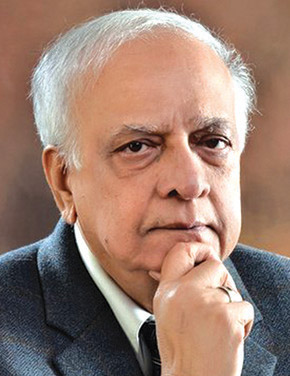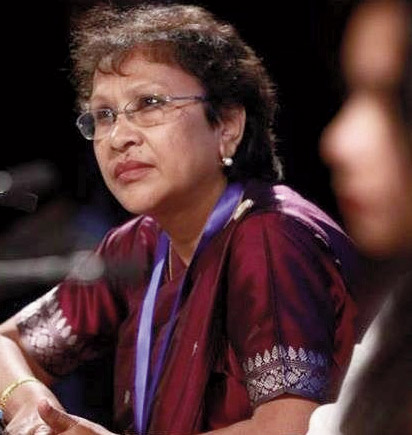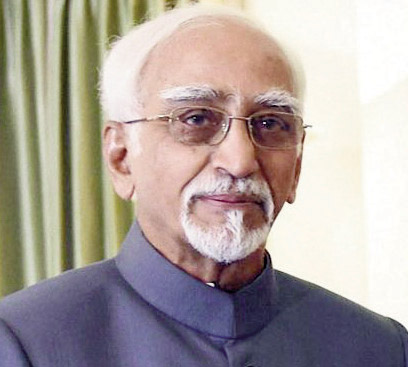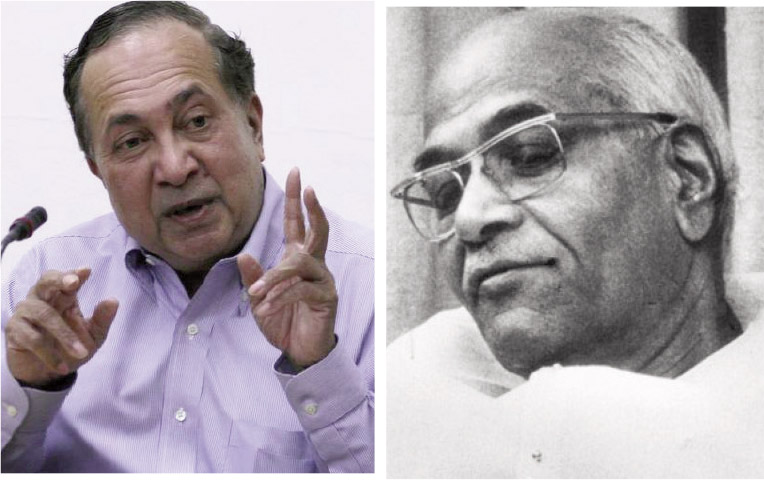Media’s freedom is
sacrosanct in democracy

 Hari Jaisingh
Hari Jaisingh
Amidst the lengthening
shadow of intellectual
dishonesty, pretensions,
fallacious reasoning and
increasing partisan
politics on what is right
and what is wrong, the Indian
Media’s sole strength of the Freedom
of Expression has of late been getting
threatened.
The Indian intelligentsia has been
politicised, with the result the truth
becomes the first casualty. This is not
what we had bargained for. We, in
the intricate world of the media,
always expect the intelligentsia not to
be indifferent to ugly facets of
national happenings. Today, this has
become a tall order.
We believe that democracy
flourishes best when the
intelligentsia class, media
personnel included, leads the people correctly and puts the
truth - and unbiased truth- before
the nation. But it so happens, that
even the face of the media has of
late undergone a change.
Barring certain exceptions, a
section of the print and electronic
media has become part of big
business groups owing allegiance to
political outfits and their interests.
We know the fallout of such a
“guided mechanism”. I do not wish to
go into the larger issue of the
changing media face. What is
gratifying is the fighting spirit among
large sections of media persons and
their professional bodies that know
how and when to pounce upon the
“authorities” to speak out and
safeguard the freedom of expression
and the people’s right to information.
On the Rafale deal
reportage in The Hindu
by N Ram, the Editors
Guild of India, the Press
Club of India and the
Women’s Press
Association have rightly
condemned the
government’s stand and
sought a review of the
Official Secrets Act (OSA)
as well as the law on
defamation. It underlines
the fighting spirit of
media persons despite
several odds against
them.
On the Rafale deal reportage in
The Hindu by N Ram, the Editors
Guild of India, the Press Club of
India and Women’s Press
Association, have condemned the
government’s stand and sought a
review of the Official Secrets Act
(OSA) as well as the law on
defamation. This is really
heartening. It underlines the
fighting spirit of media persons
despite several odds against them.
Looking back, I remember the
journalists of all shades and opinions
got united against Prime Minister
Rajiv Gandhi’s ill-conceived
Defamation Bill which had aimed at
curbing their freedom. That was the
media’s basic resilience which earlier
got reflected when Indira Gandhi
imposed the severe “emergency
dose”. Even the highest judiciary of
the land caved in for a while amidst
the atmosphere of “committed
judiciary”.
Mercifully, despite some
functional handicaps, the rough
edges of common sense among
ordinary people too came alive, even
in the rural areas.
Awareness is the key
to the success of
democracy. Hence the
importance of free
flow of information
and opinions.
American scholar Ben
H Bagdikian has
rightly said, “diversity
and richness in the
media are not
ornaments of a
democracy but
essential elements for
survival”.
I am bringing these historical facts
before our readers to highlight the
basic point that awareness is the key
to the success of democracy. Hence
the importance of free flow of
information and opinions. In this
context, I agree with American
scholar Ben H Bagdikian, who said,
“diversity and richness in the media
are not ornaments of a democracy
but essential elements for survival.
 Patricia Mukhim
I am raising these matters in the
light of certain unpleasant
happenings in the Indian media
world. First comes the Meghalaya
court’s “verdict” against the
prestigious publication of The
Shillong Times in which editor
Patricia Mukhim and publisher
Shobha Chaudhuri were held for
contempt of court. The penalty of Rs
2 lakh each apart, the court said that
“The Shillong Times” would be
banned”. While the Editors Guild of
India is expected to play its role, the
management of The Shillong Times
needs to take its case to the Supreme
Court. I hope the apex court will live up to its reputation and rescue the
honour and prestige of The Shillong
Times and save the media’s and the
people’s right to the freedom of
expression.
Patricia Mukhim
I am raising these matters in the
light of certain unpleasant
happenings in the Indian media
world. First comes the Meghalaya
court’s “verdict” against the
prestigious publication of The
Shillong Times in which editor
Patricia Mukhim and publisher
Shobha Chaudhuri were held for
contempt of court. The penalty of Rs
2 lakh each apart, the court said that
“The Shillong Times” would be
banned”. While the Editors Guild of
India is expected to play its role, the
management of The Shillong Times
needs to take its case to the Supreme
Court. I hope the apex court will live up to its reputation and rescue the
honour and prestige of The Shillong
Times and save the media’s and the
people’s right to the freedom of
expression.
Then, we have before us the
larger issue of reports in The
Hindu on the Rafale deal by N
Ram, Chairman of The Hindu
publishing group. I personally
know N Ram. He is a credible
professional journalist of high
integrity. He has clearly stated,
“what we have published is
perfectly justified (and) in public
interest”. He has also said, “We
have not stolen the Rafale deal
documents”. He categorically
stated that “we will not disclose
our sources”. Well said, N Ram
whom I admire for his high
professional calibre and
objectivity.
As it is, whichever government is
in power, two sharp-edged swords
hang over the heads of media
persons who are in pursuit of their
professional work, especially of
investigative nature. One,
Defamation Law. Second, the Official
Secrets Act (OSA).
Both laws are colonial in their
origin as well as in nature. These
speak of the colonial mentality of
our elected governments. They
follow the three legendary
monkeys who never see functional
flaws of theirs; frown upon those who do not toe their lines and
selectively act against those who
happen to be on the other side of
the politico-ideological divide.
Of course, not all past
governments have followed the three
monkeys’ mantras. But ever since
the BJP’s Modi government came to
power at the Centre, we often see the
love-hate syndrome towards the
media has come to the fore. Besides,
media personnel are often faced with
the unknown factor, the judiciary
mindset. The net effect is of
avoidable harassment of those
editors, publishers and poor
correspondents who stand by the
“truth”!
The Rafale deal has
acquired political
overtones because of the
play of big money in it. I
do not wish to get lost in
the on-going political
games of the BJP v.
Congress and behind the
scene beneficiaries. Well,
this has been the political
pattern when defence
deals are written in
secrecy on the plea of
“national security".
 Hamid Ansari
Even former Vice-President Hamid
Ansari has admitted that the OSA is
“archaic and irrelevant”. He said that
“strident nationalism has no
hesitation in transcending and
transgressing individual rights
guaranteed in the Constitution. It,
therefore, has to be guarded against
the OSA”. But, who will stand up and
be counted? This job can be done by
media persons backed up by the
judiciary.
Hamid Ansari
Even former Vice-President Hamid
Ansari has admitted that the OSA is
“archaic and irrelevant”. He said that
“strident nationalism has no
hesitation in transcending and
transgressing individual rights
guaranteed in the Constitution. It,
therefore, has to be guarded against
the OSA”. But, who will stand up and
be counted? This job can be done by
media persons backed up by the
judiciary.
Regrettably, India’s VVIP’s
maintain studied silence while in
power and speak out boldly when
they are on the other side of the
corridors of power. I remember
during the Congress-led UPA
regimes, a number of ministers
promised to do the needful, but
nothing was done. This is India !
Take the famous Rafale deal story.
It has acquired political overtones,
which is understandable because of
the play of big money in the deal. I do
not wish to get lost in the on-going
political games of the BJP v. Congress
and behind the scene beneficiaries.
Well, this has been the political
pattern when defence deals are
written in secrecy on the plea of
“national security”.
 N Ram and Ramnath Goenka
India has well-defined norms for
selection of weapons, with no
middlemen and “kickbacks”.
However, in practice, nothing could
be farther from the truth. We have
seen this in the purchase of Bofors guns and HBV submarines.
Investigative reports and certain
documents published then by N
Ram’s The Hindu and Ramnath
Goenka’s Indian Express exposed
Bofors’ “dangerous business” of
hush-hush deals. Therein lies the
Indian tragedy of the system sans
transparency and accountability. This
is a telling commentary on the
standard of governance even in
Narendra Modi’s India today.
N Ram and Ramnath Goenka
India has well-defined norms for
selection of weapons, with no
middlemen and “kickbacks”.
However, in practice, nothing could
be farther from the truth. We have
seen this in the purchase of Bofors guns and HBV submarines.
Investigative reports and certain
documents published then by N
Ram’s The Hindu and Ramnath
Goenka’s Indian Express exposed
Bofors’ “dangerous business” of
hush-hush deals. Therein lies the
Indian tragedy of the system sans
transparency and accountability. This
is a telling commentary on the
standard of governance even in
Narendra Modi’s India today.
Viewed in this larger perspective,
N Ram, has done a remarkable
professional job with his series of
write-ups in The Hindu on the Rafale
deal. India’s Attorney General K V
Venugopal first claimed that N Ram
published documents that were
“stolen” from the defence ministry.
Later, he changed his tone and said
that they were photo-copies.
N Ram has made it clear. “We
didn’t pay any money for this
information” (it) came on its own,
purely in public interest”. Herein
lies the strength of our vibrant
democracy, and the public
vigilance.
Prevailing atmosphere in the
country has to end. Undoubtedly,
defence matters have to be dealt
with carefully. Strategic and
operational affairs have to be
classified. But the tendency today is
to discourage a free debate even on
routine matters of pricing etc.
Secretiveness is the antithesis
of democracy. It indirectly aids to
corruption and corrupt practices.
Less of secrecy and more of
openness are the basic
requirements for building our
much-needed corruption-free
polity. This could help strengthen
the roots of democracy.
Equally crucial is the simplification
of procedures. For this, it is necessary
to reorient the administrative
structure and revamp the
established procedures with a view
to helping honest citizens. The real
challenge before us is how to ensure
transparency and public
accountability which must be part of
our working democracy.



